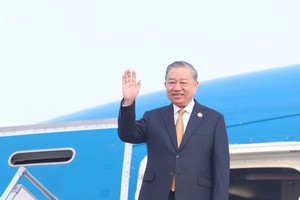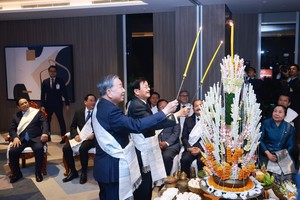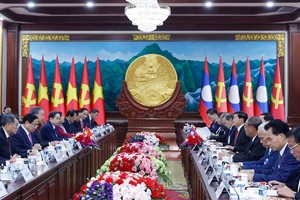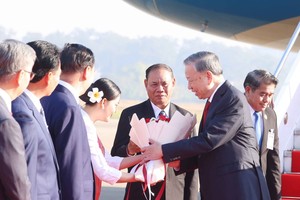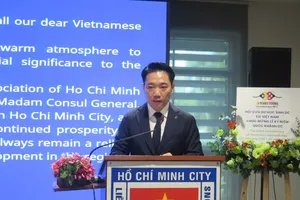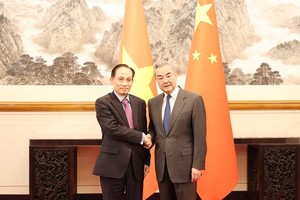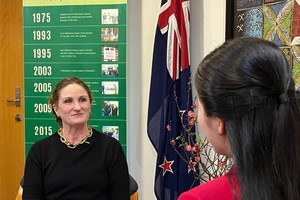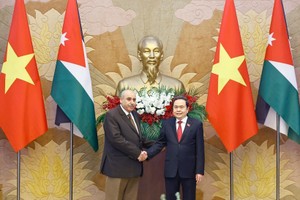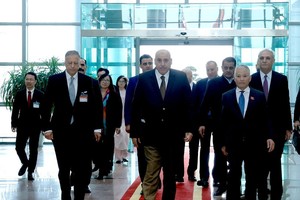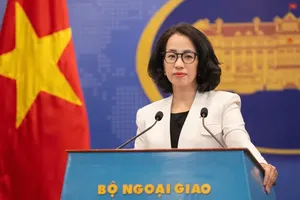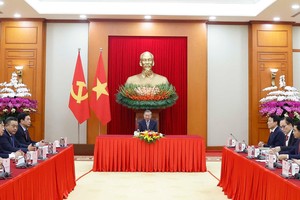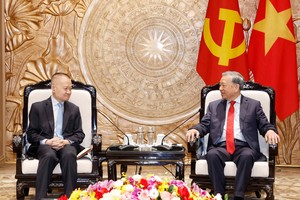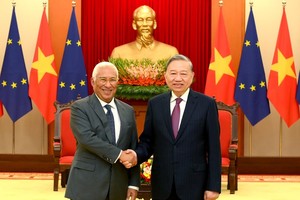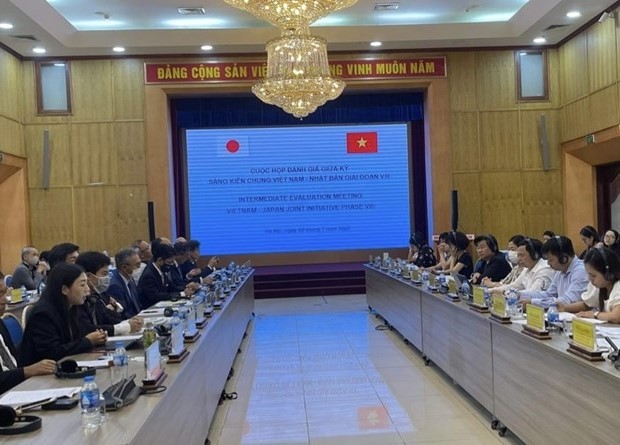 At the mid-term review meeting (Photo: MPI)
At the mid-term review meeting (Photo: MPI)
It was reported at the meeting that 47 out of the total 80 sub-items in the joint initiative have been well implemented as scheduled so far, 15 are underway, six make no progress, and work will start on 12 others in the time ahead.
Do Nhat Hoang, head of the Foreign Investment Agency under the MPI, said Vietnamese ministries and agencies have coordinated with the Japanese side to implement commitments in the action plan of the initiative.
Vietnam’s commitment to materializing the joint initiative manifests the government’s resolve to improve the domestic investment environment, he said.
Many legal documents have been amended and adopted within the framework of the initiative, he noted, adding that Vietnamese ministries and agencies have also taken into consideration many recommendations of Japan during the consolidation process of fine-tuning laws and policies, as well as law enforcement.
Envoy Okabe Daisuke from the Japanese Embassy emphasized that the two sides will continue their coordination and implementation of commitments in the action plan to make the eighth phase a success, contributing to improving the Vietnamese business environment, for the development and prosperity of both Vietnamese and Japanese business communities.
The Vietnam-Japan Joint Initiative was launched in April 2003 as a special cooperation mechanism between the Vietnamese and Japanese Governments.
It serves as a policy dialogue forum between Japanese investors and relevant Vietnamese ministries and agencies, where proposals are made to help competent Vietnamese agencies fine-tune laws and policies.
Over the past 19 years, the initiative has helped create an open and transparent business and investment environment in Vietnam.
The eighth phase of the initiatives focuses on 11 groups of issues, including the publication and application of case law/civil judgment enforcement/competition regime; the Law on Investment and the Law on Enterprises; improvement of the working environment; promoting infrastructure investment in the form of public-private partnership (PPP); reform of state-owned enterprises and stock market; method of implementing specific measures to create the best electricity structure in Vietnam; and efforts to improve laws and regulations related to natural gas pipeline construction and promote import of liquefied natural gas.
They also cover land-related issues; the supporting industry; activities of the Vietnam National Innovation Center (NIC) and innovation activities in localities and businesses; and highly skilled human resources development.
Because the global economy was seriously affected by the Covid-19 pandemic, especially disruptions in supply chains, Vietnam and Japan agreed to add three new groups of issues: development of the supporting industry, innovation and development of highly skilled human resources.
Do Nhat Hoang, head of the Foreign Investment Agency under the MPI, said Vietnamese ministries and agencies have coordinated with the Japanese side to implement commitments in the action plan of the initiative.
Vietnam’s commitment to materializing the joint initiative manifests the government’s resolve to improve the domestic investment environment, he said.
Many legal documents have been amended and adopted within the framework of the initiative, he noted, adding that Vietnamese ministries and agencies have also taken into consideration many recommendations of Japan during the consolidation process of fine-tuning laws and policies, as well as law enforcement.
Envoy Okabe Daisuke from the Japanese Embassy emphasized that the two sides will continue their coordination and implementation of commitments in the action plan to make the eighth phase a success, contributing to improving the Vietnamese business environment, for the development and prosperity of both Vietnamese and Japanese business communities.
The Vietnam-Japan Joint Initiative was launched in April 2003 as a special cooperation mechanism between the Vietnamese and Japanese Governments.
It serves as a policy dialogue forum between Japanese investors and relevant Vietnamese ministries and agencies, where proposals are made to help competent Vietnamese agencies fine-tune laws and policies.
Over the past 19 years, the initiative has helped create an open and transparent business and investment environment in Vietnam.
The eighth phase of the initiatives focuses on 11 groups of issues, including the publication and application of case law/civil judgment enforcement/competition regime; the Law on Investment and the Law on Enterprises; improvement of the working environment; promoting infrastructure investment in the form of public-private partnership (PPP); reform of state-owned enterprises and stock market; method of implementing specific measures to create the best electricity structure in Vietnam; and efforts to improve laws and regulations related to natural gas pipeline construction and promote import of liquefied natural gas.
They also cover land-related issues; the supporting industry; activities of the Vietnam National Innovation Center (NIC) and innovation activities in localities and businesses; and highly skilled human resources development.
Because the global economy was seriously affected by the Covid-19 pandemic, especially disruptions in supply chains, Vietnam and Japan agreed to add three new groups of issues: development of the supporting industry, innovation and development of highly skilled human resources.




